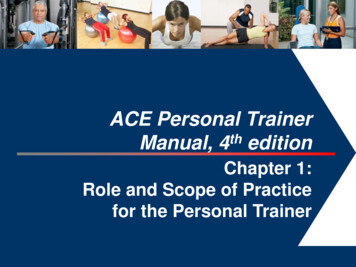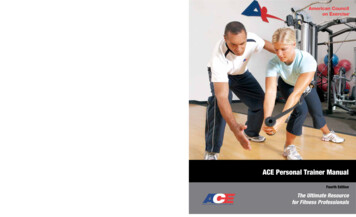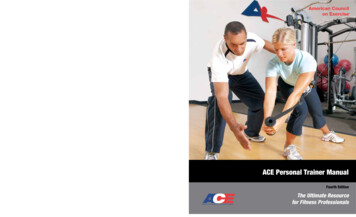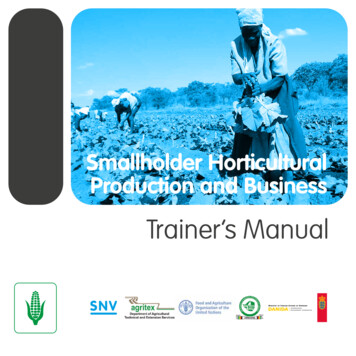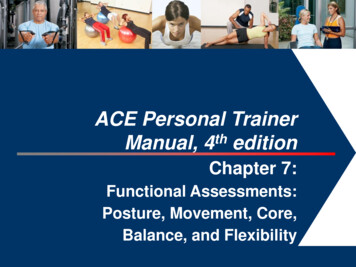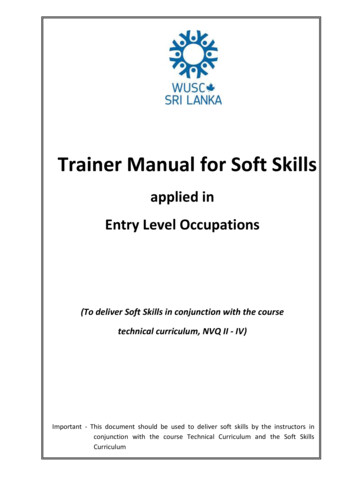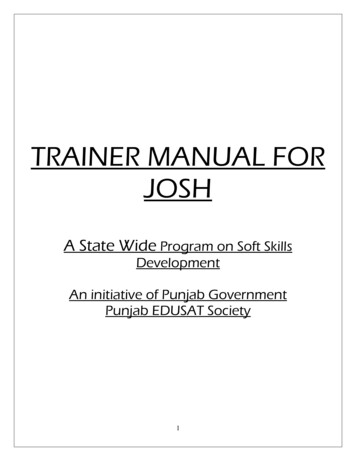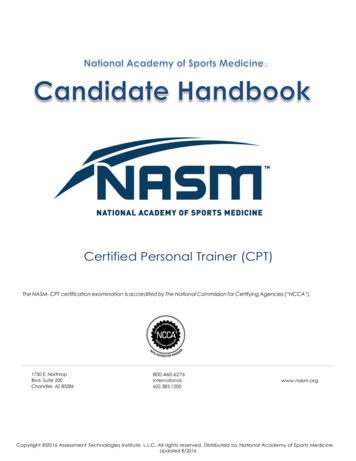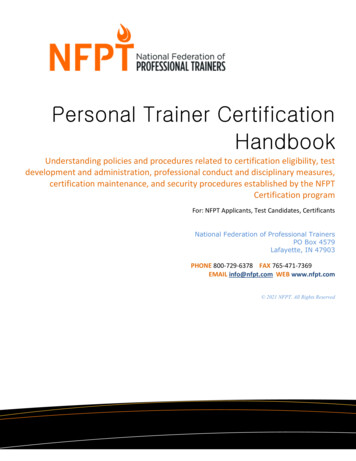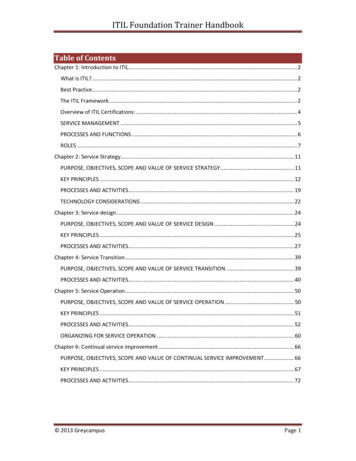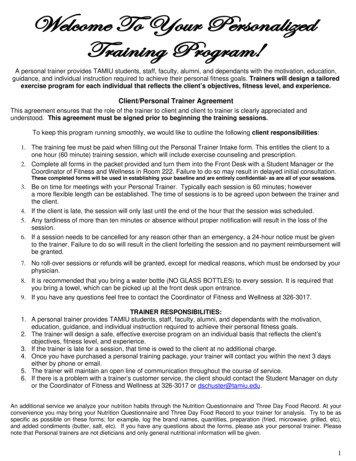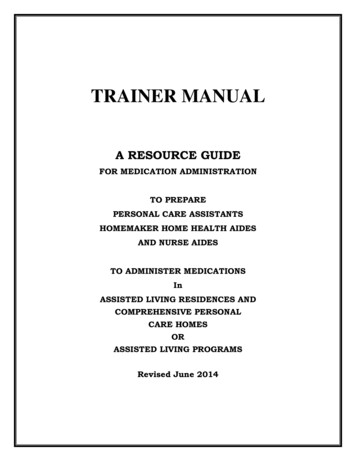
Transcription
TRAINER MANUALA RESOURCE GUIDEFOR MEDICATION ADMINISTRATIONTO PREPAREPERSONAL CARE ASSISTANTSHOMEMAKER HOME HEALTH AIDESAND NURSE AIDESTO ADMINISTER MEDICATIONSInASSISTED LIVING RESIDENCES ANDCOMPREHENSIVE PERSONALCARE HOMESORASSISTED LIVING PROGRAMSRevised June 2014
ACKNOWLEDGMENTWe would like to express our appreciation to the following individuals of the New JerseyDepartment of Health, who contributed their time, knowledge and talents to thedevelopment and revisions of this manual. Without their cooperation, creation of thistrainer manual would not have been possible.Barbara Goldman, R.N., J.D.Assistant DirectorOffice of Certificate of Need and Licensure(Marguerite) Anne Ward, RN, CALA (Retired)Health Care Services Evaluator /NurseAssisted Living ProgramIn grateful appreciation for their valuable contributionsto the development of this Training ManualHenry T. Kozek, RPh, MPA, CCP, CPM (Retired)EditorProgram ManagerCertification ProgramElinor Fritz, RN, MA (Retired)DirectorAssessment and Survey2
TABLE OF CONTENTSAcknowledgementTable of ContentsIntroductionQualifications and Requirements for Trainers and TraineesHow to Train Personal Care Assistants for Medication AdministrationHow to Use The Resource GuideTask-Oriented Outline of Program ContentPART 1Preparing to Function Effectively in Administering MedicationsAnd Assisting with Self-Administration of Medications23-45-6789-1021-2617Duty Area 1:Delegation of Selected Nursing Tasks18-21Duty Area 2:Identify Medication Terminology and Abbreviations22-27Duty Area 3:Identify Classes of Medications28-42Duty Area 4:Recognize Medication Purposes and Effects43-50Duty Area 5:Pharmacy Container or Package Labels51-58Examples of Commonly Prescriber Branded/Generic Medications59-60Duty Area 6:Medication Administration Records (MARs) and other forms61-68Duty Area 7:Demonstrate the Five Rights of Medication Administration69-76Duty Area 8:Organize to Administer Medications to Residents77-80Duty Area 9:Measure and Record Vital Signs Prior to Medication Administration81-86Duty Area 10: Administer Oral Medications Correctly87-92Duty Area 11: Report and Document a Client/Resident Refusal to Take Medication93-97Duty Area 12: Document Medication Errors98-101Institute for Safe Medication Practices102-104Duty Area 13: Dispose of Medications105-107Duty Area 14: Store and Secure All Medications108-112Duty Area 15:113-116Maintain an Inventory of MedicationsExamples of Schedule II Controlled Substances117Duty Area 16: Administer Medication via Gastrostomy Tube118-1223
TABLE OF CONTENTSPART 2Administering and Assisting Residents with Self-Administration ofprepared Instillations, Treatments and Injections123Introduction124Duty Area 2.1: Identify diabetes medications; demonstrate proper pen injection technique andidentify and respond to symptoms of hypoglycemia125-130Duty Area 2.1(a) Demonstrate proper pen injection technique for medications other thanInsulin131-132Duty Area 2.2: Perform direct administration of appropriate medications through aGastrostomy tube (g-tube)133-136Duty Area 2.3: Assist resident with self-administration or perform direct administrationof ophthalmic (eye) preparations137-141Duty Area 2.4: Assist resident with self-administration or perform direct administrationof otic (ear) preparations142-145Duty Area 2.5: Assist resident with self-administration or perform direct administrationof nasal medication146-150Duty Area 2.6: Assist resident with self-administration or perform direct administrationof topical medications151-154Duty Area 2.7: Assist resident with self-administration or perform direct administrationof vaginal medications155-158Duty Area 2.8: Assist resident with self-administration or perform direct administrationof rectal medications159-163Duty Area 2.9: Assist resident with self-administration or perform direct administrationof inhalation preparations164-168Appendix ARegulations N.J.A.C. 8:36-9.2 Certified Medication Aides169-171Appendix BRegulations N.J.A.C. 8:36-11.5 Certified Medication Aide Program172-174Appendix CQuestions and Answers About The Delegation of the Medication AdministrationTask175-1844
INTRODUCTIONThis Resource Guide for Medication Administration is designed to assist FacilityTrainers/Instructors in preparing selected, qualified Personal Care Assistants (PCAs) NurseAids (NA) & Homemaker Home Health Aids (HHA) for the responsibility of administeringmedications, under the circumstances when a RN delegates this task. For brevity, use ofPersonal Care Assistant (PCA) shall include NA and HHA throughout this manual.Delegation of the medication administration task to a PCA who has earned the CertifiedMedication Aide (CMA) Credential may occur in Assisted Living Residences andComprehensive Personal Care Homes, or as part of an Assisted Living Program. The NewJersey Department of Health (Department) licenses these facilities. Problems or questionsregarding the administration of medications by Certified Medication Aides in these settingsshould be referred to the Department at 609-633-8990.In accordance with N.J.A.C. 13:37-6.2, only a Registered Professional Nurse may delegate themedication administration task. Licensed Practical Nurses are not authorized to delegate thistask.Assistance with Self-Administration versus Direct Administration of MedicationsAn essential element of assisted living is that residents should be encouraged to maintain theirautonomy and to participate in self-care. To the extent that they are capable, residents inassisted living settings should self-administer their medications. Whenever possible, they shouldkeep their supply of medications in their own apartment/room. For residents who are unable toindependently self-administer medications, supervision and assistance with taking medicationsshould be provided.This training course will give PCAs who have earned the Certified Medication Aide credential,the knowledge they require to assist residents with self-administration. However, a heavyemphasis is placed on procedures for direct administration of medications for those residentswho are not able to self-administer, due to the greater complexity of responsibility that isinvolved in performing this task under the RN's delegation. It remains the RN's duty to assessresidents' capabilities, encourage self-administration of medications whenever possible anddetermine which individuals require direct administration of medications.When residents require direct administration of medications, the regulations necessitate thatmedications be administered by the Certified Medication Aide (CMA) in their unit-of-use or unitdose medication distribution system. If CMAs are to administer medications, facilities mustmake appropriate arrangements with a provider pharmacy to ensure unit-of-use or unit dosepackaging. This training course requires that all prescription medications will be administeredby the CMA in this manner. The exceptions to this rule are - Over-the–counter medications donot require unit dose and liquid medications (both over-the counter and prescription) do notrequire unit of use packaging.5
Communication Between the Nurse, Physician, Pharmacist and CMAIn training the Personal Care Assistant (PCA) to administer medications as a CMA, this courseemphasizes that the CMA and the delegating RN must maintain frequent close communication.Numerous professional judgments and decisions must be made in relation to the medicationadministration task. Only the RN has the expertise and authority to make such judgments anddecisions, in consultation with the resident's physician and pharmacist.The RN maintains full responsibility for communicating with residents’ physicians andpharmacists concerning medication issues and, when delegating the medication administrationtask, for conveying necessary instructions to the CMA. Throughout this training course,Personal Care Assistants are advised to communicate exclusively with the delegating RNregarding all medication matters. The CMA is not trained to follow orders from, takedirections from or otherwise interact with residents' physicians or pharmacists.In assisted living facilities where medications will be administered by the CMA, it is essentialthat the delegating RN, including alternates and on-call RNs, be readily accessible to the CMAat all times. This course instructs the CMA to notify the facility administrator in those rareinstances when the delegating RN cannot be reached for medication problems. It is the facilityadministrator's responsibility to assure adequate, on-call registered professional nursingcoverage so that the RN may address any questions or problems experienced by the CMAadministering medications.Pharmacy questions regarding the Trainer Manual may be directed to:Bonnie G. Stevens, RPh, C.C.P.Supervising Health Care EvaluatorDivision of Health Facility Survey & Field OperationsDepartment of HealthPO Box 367Trenton, NJ 08625-0367(609) 633-8981 phone(609) 943-4977 FAXBonnie.Stevens@doh.state.nj.usCMA/Nursing questions regarding the Trainer Manual may be directed to:Janet Kotkin, RN, CALASupervisor of InspectionsDivision of Health Facility Survey & Field OperationsDepartment of HealthPO Box 367Trenton, NJ 08625-0367(609) 633-8981 phone(609) 943-4977 FAXJanet.Kotkin@doh.state.nj.us6
QUALIFICATIONS AND REQUIREMENTS FORTRAINERS AND TRAINEESTRAINER/INSTRUCTOR:Refers to the individual(s) responsible for teaching the course in medication administration.Requirements:1.Current Licensure as a Registered Professional Nurse in good standing.2.At least 24 months of clinical experience including medication administrationresponsibilities, or at least two years experience teaching nursing courses, within the pastfive years.3.Consultation/collaboration with a registered pharmacist. The pharmacist's credentials mustbe submitted at the time that the RN applies to the Department of Health (Department) tobecome a Trainer/Instructor.4.Completion of a Department-approved, one-day orientation course or workshop regardinguse of this Resource Guide.5.The New Jersey Registered Pharmacist shall also be required to complete the one-dayorientation course.6.Individuals who are interested in becoming Trainers/Instructors and taking the orientationcourse or workshop must first submit to the Department or agency authorized by theDepartment to conduct the training all documentation of required credentials andprofessional experience. Only those individuals who have been approved will be eligible totake the orientation course and to become Trainers/Instructors.PERSONAL CARE ASSISTANT MEDICATION ADMINISTRATION TRAINEE:Refers to an individual who receives training to administer medications under the RN’sdelegation in either an Assisted Living Residence or Comprehensive Personal Care Home, oras part of an Assisted Living ProgramRequirements:1.Current certification in good standing as a Nurse Aide, Homemaker Home Health Aide orPersonal Care Assistant (having completed a Department-approved course).2.Must be able to satisfactorily read, write and comprehend English and demonstratearithmetic skills.3.Successful completion of the medication administration training course, skills evaluation,and a statewide, standardized, written competency test.4.Documentation of successful course completion with a certificate/letter from an approvedFacility Trainer/Instructor maintained on file at the facility.7
HOW TO TRAIN PERSONAL CARE ASSISTANTSFOR MEDICATION ADMINISTRATIONIn order for the RN to delegate medication administration, Personal Care Assistants must have"received verifiable education and demonstrated the adequacy of their knowledge, skill andcompetency to perform the task being delegated" (N.J.A.C. 13:37-6.2(d)). This Resource Guidefor Medication Administration contains a curriculum that must be mastered by the Personal CareAssistant in order to fulfill the educational requirement. Demonstration of "knowledge, skill andcompetency" by the Certified Medication Aide will occur in the following ways:1.Successful completion of all "Evaluation" exercises contained within the ResourceGuide.2.Successful passage of a statewide, standardized, written test (trainees will receive apicture certificate and laminated picture wallet size card to show that they have passedthe examination).3.Quarterly, direct observation and supervision of the medication administration task bythe delegating RN.It is the Trainer/Instructor’s responsibility to assure that Personal Care Assistants are qualifiedto take the medication administration training course. The Personal Care Assistant must haveeither:1.Completed a nurse aide training course approved by the New Jersey StateDepartment of Health and shall have passed the New Jersey Nurse Aide CertificationExamination and be currently certified; or2.Completed a Homemaker-Home Health Aide training program approved by the NewJersey Board of Nursing and shall be so certified by the Board and be currentlycertified; or3.Completed a Department of Health approved course for the PCA that emphasizes theconcepts of assisted living and be currently certified.In addition to meeting the qualifications listed above, the candidate must be able to read andwrite English and demonstrate arithmetic skills. The Trainer/Instructor should verify thatprospective trainees have these basic skills, which are essential to the medicationadministration task.After selecting qualified trainees, the Trainer/Instructor should implement the curriculum in thisResource Guide.8
HOW TO USE THE RESOURCE GUIDE AND COMPLETEMEDICATION ADMINISTRATION TRAININGThe Resource Guide is divided into two parts. PART 1 contains duty areas aimed at preparingthe Personal Care Assistant to function effectively in administering medications. PART 2concerns the administration of injections and prepared treatments and instillations. TheResource Guide is further organized around a series of "duty areas" that are facets ofmedication administration. Each duty area includes:1.Objectives;2.Topical Outline and Activities;3.Evaluation exercises;4.Instructor materials and/or5.Trainee handouts.NOTE: Instruction regarding insulin injection is an integral part of the medication trainingcourse. More information on diabetes and injection devices may be obtained through: The National Diabetes Education Program at http://ndep.nih.gov/ ; Eli Lilly & Company at 800-545-5979 or http://www.lillydiabetes.com/Pages/index.aspx ; Novo Nordisk Pharmaceuticals, Inc. at 609-987-5800 or www.novonordisk-us.com ; Meredith Corporation at ulin/how-to-use-insulin-pen ; Sanofi-Aventis at 1-800-981-2491 or www.sanofi-aventis.us or From your provider pharmacy or pharmacist consultant.As stipulated in the requirements for Trainers/Instructors, the registered professional nurse (RN)shall collaborate/consult with the consultant or facility pharmacist in teaching the course. Thereare portions of the curriculum that are best taught by the pharmacist, In any case, the RNTrainer/Instructor and pharmacist should review the curriculum together and determine how,when, and where material should be presented, as well as identifying how facility-specificprocedures and policies regarding medication administration should be incorporated.The curriculum must take a minimum of 30 hours to complete. Competency training is spreadover several weeks to allow additional time for practice and the recommended minimum ofthree directly supervised medication passes prior to determining candidate eligibility for thewritten examination.A “Trainee Task Record” (see pages 14-16) should be completed for each individual. TheTrainer/Instructor is responsible for keeping these records and must give a signed copyto the PCA at completion of the course. The Trainer/Instructor should inform students of thetesting locations and any other pertinent information about the examination process (this can beobtained from the Department).9
It is important for the Trainer/Instructors to provide carefully supervised practice opportunities forthe Personal Care Assistant to administer medications in the facility. This is a critical part of thelearning process for trainees, as well as a mechanism for the Trainer to evaluate taskcompetency. However, it is not permissible for the Personal Care Assistant to administermedications without direct, one-on-one supervision and assistance by a RN, until after thetrainee has passed the statewide examination and received her/his certification for medicationadministration.Subsequent to the Personal Care Assistant's certification for medication administration, the RNshall directly observe the individual administering medications. To promote and verify taskcompetency, the Department of Health recommends that this supervision occur at leastweekly during the first month after certification. This supervision shall be documented and arecord maintained in the CMA’s file. In addition, all CMAs shall be observed at least quarterly onan on- going basis and the results documented and maintained in the CMA’s file. Quarterlymedication administrations may be observed by either the RN or pharmacist, with thecompletion of the appropriate documentation of competency.10
PERSONAL CARE ASSISTANT MEDICATIONADMINISTRATION TRAINING PROGRAMTask-Oriented Outline of Program ContentPART 1:Preparing to function effectively in administering medications and assisting residents with selfadministration of medications.Duty stand the Certified Medication Aide’s scope and limits of responsibility inadministering medications, in relation to Department of Health Licensing regulationsand the New Jersey Nurse Practice Act.Identify medication terminology and abbreviations.Identify classes of medications.Recognize medication purposes and effects.Pharmacy container or package labels.Use Medication Administration Records (MAR) and other medication forms.Demonstrate the “five rights” of medication administration.Organize to administer medications to one or more residents.Measure and record vital signs prior to medication administration, if required.Administer oral medications correctly.Report and document a resident refusal to take medication.Document medication errors.Dispose of medications.Store and secure all medications.Maintain an inventory of medications.Administration of medications via gastrostomy tube.PART II:Administering and assisting the resident with self-administration of prepared instillations,treatments, and pen injections.Duty Areas:2.12.22.32.42.52.62.72.82.9& 2.1(a) Assist resident or administer diabetes and other medications and pre-drawninsulin or other injections.Administer medication via gastrostomy tubeAssist resident or administer eye medications.Assist resident or administer ear medications.Assist resident or administer nasal medications.Assist resident or administer topical medications.Assist resident or administer vaginal medications.Assist resident or administer rectal medications.Assist resident or administer inhalation medications.11
TRAINER/INSTRUCTOR ORIENTATION REGARDINGMEDICATION ADMINISTRATION COURSETopical Outline of Program ContentAll Trainers/Instructors shall have orientation in program content as outlined belowPurpose:Persons designated as Trainers/Instructors will receive orientation in instructional practices inorder to enhance the effectiveness of the training they provide to Personal Care Assistantsregarding the delegation of medication administration.Objectives:Upon successful completion of the orientation, Trainers/Instructors will be able to: Manage the Personal Care Assistant medication administration training programs ather/his facility; Understand the role of the registered pharmacist in providing consultation/collaboration; Understand her/his role as a Trainer/Instructor; Identify characteristics of the adult learner; and Implement a competency-based app
Duty Area 5: Pharmacy Container or Package Labels 51-58 . Examples of Commonly Prescriber Branded/Generic Medications 59-60 . Duty Area 6: Medication Administration Records (MARs) and other forms 61-68 . Duty Area 7: Demon
